The Western Digital Black PCIe SSD (512GB) Review
by Billy Tallis on March 8, 2017 8:30 AM ESTSequential Read Performance
The sequential read test requests 128kB blocks and tests queue depths ranging from 1 to 32. The queue depth is doubled every three minutes, for a total test duration of 18 minutes. The test spans the entire drive, and the drive is filled before the test begins. The primary score we report is an average of performances at queue depths 1, 2 and 4, as client usage typically consists mostly of low queue depth operations.
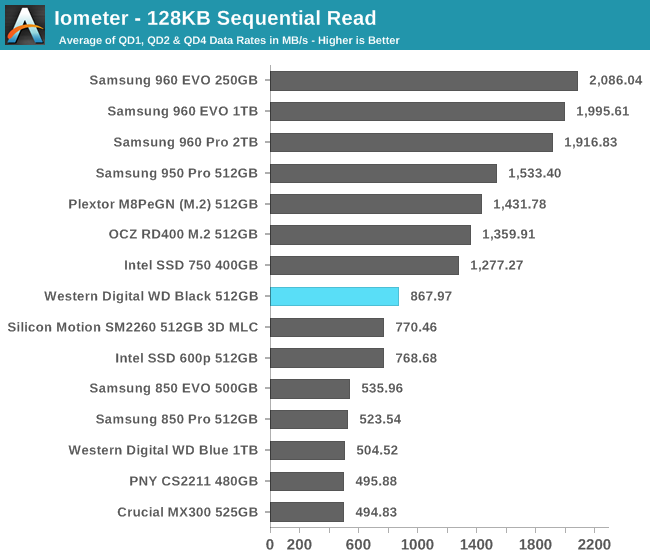
The sequential read speed of the WD Black beats the Silicon Motion SM2260 drives (both MLC and TLC), but the WD Black is otherwise way behind the rest of the PCIe SSDs.
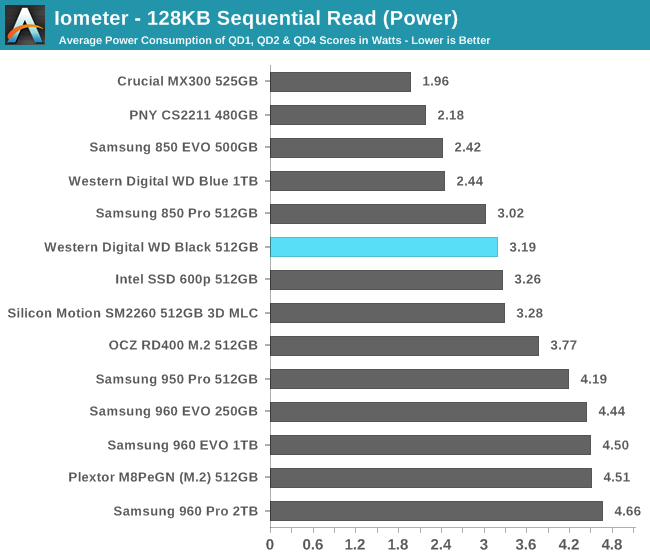
The WD Black has lower power draw than any other PCIe SSD during the sequential read test, and its efficiency is better than almost all other TLC drives (SATA or PCIe). However, the WD Black's efficiency is still about 60% worse than the Samsung 960 EVO.
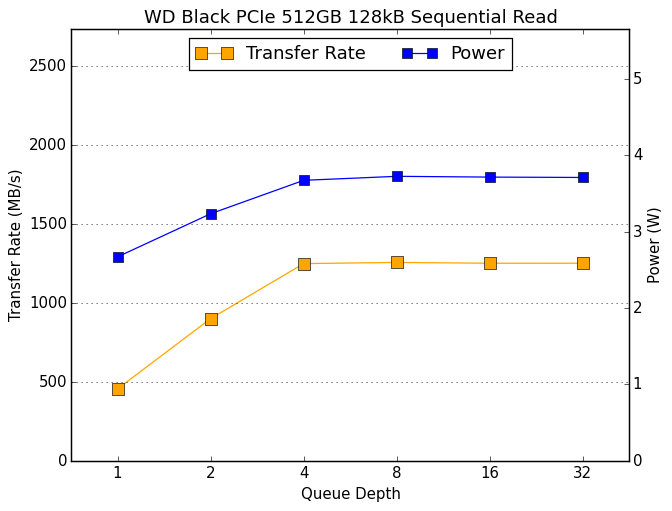 |
|||||||||
At QD 1 the WD Black is performing close to the limit of SATA, and it saturates by QD4 at almost 1.3GB/s. Power consumption never quite reaches 4W, so thermal throttling is very unlikely.
Sequential Write Performance
The sequential write test writes 128kB blocks and tests queue depths ranging from 1 to 32. The queue depth is doubled every three minutes, for a total test duration of 18 minutes. The test spans the entire drive, and the drive is filled before the test begins. The primary score we report is an average of performances at queue depths 1, 2 and 4, as client usage typically consists mostly of low queue depth operations.
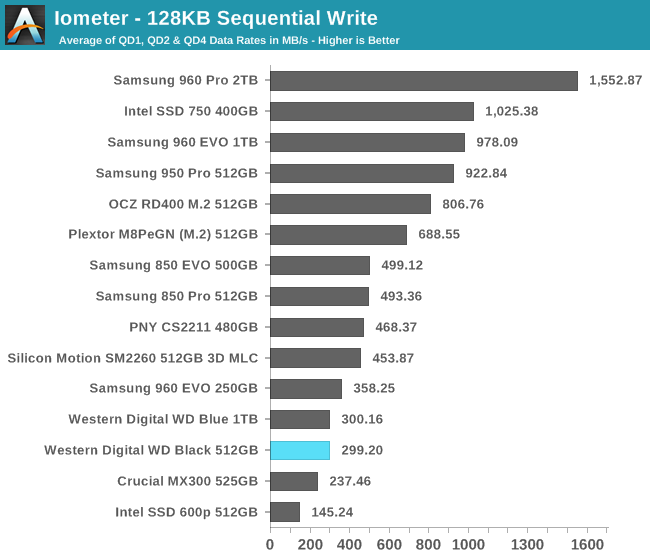
The sequential write speed of the WD Black is tied with the WD Blue and outperforms only the drives using IMFT 3D TLC. The Samsung 960 EVO and all of the MLC SSDs in this comparison sustain much better sequential write performance.
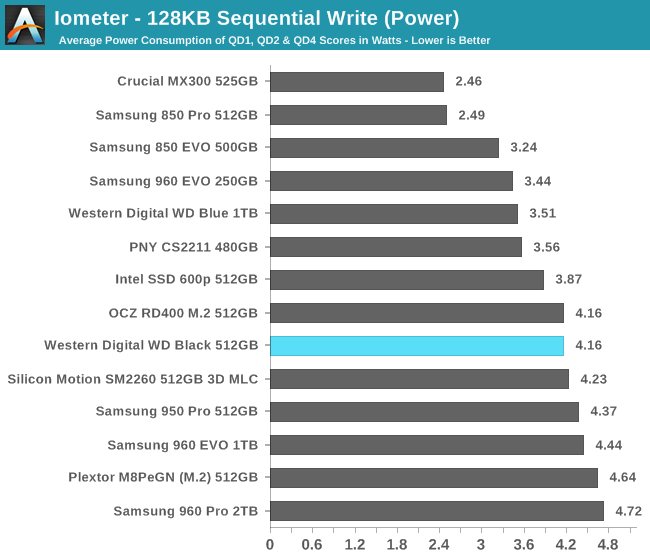
The WD Black's power consumption during the sequential write test is on par with other PCIe SSDs, giving it a typical efficiency for planar TLC SSDs. The WD Black is more efficient than the Intel 600p but loses quite badly to the other 3D TLC drives.
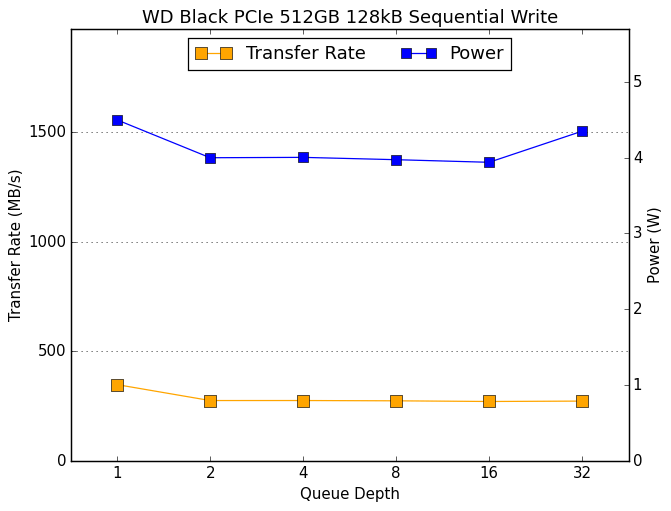 |
|||||||||
The WD Black hits steady state during the first phase of the test and power and performance remain the same for the rest of the test, except that power consumption jumps up a bit at the very end. At no point during this test does the WD Black's sequential write speed exceed what SATA SSDs are capable of.










36 Comments
View All Comments
jjj - Wednesday, March 8, 2017 - link
At least it beats the Intel lolSuch a pity that SSD makers are messing around with slow options.
As NAND prices rise, the controller becomes a smaller % of the costs so offering great perf per $ is easy, as long as you have the perf and they don't.
I do have a bit of an objection to the way you talk about the 960 EVO in your conclusions.
You haven't tested the 500GB version or at least it's not in the graphs or bench and it's hard to be accurate in estimating its perf due to the SLC cache. A review for it would be nice and maybe the very popular MyDigitalSSD.
Gothmoth - Wednesday, March 8, 2017 - link
slow options are not bad if they would give me 2 TB for 200$... :)but this is just crappy stuff.
jjj - Wednesday, March 8, 2017 - link
Slow options with PCIe x4 drives so these things that offer too little over SATA.They make sense for OEMs in laptop and SFF, lower mechanical volume but the opportunity to make a buck is bigger with faster drives right now.
ImSpartacus - Thursday, March 9, 2017 - link
Yeah, pcie drives busy doubt make sense for the budget market at the moment.It's just an unnecessary cost for a use case that doesn't need the extra benefit. 2.5" sata drives can get too cheap and are too versatile.
theuglyman0war - Sunday, March 12, 2017 - link
Whats everyone complaining about? It's a.... OOPs! Read the that 800MB/s as if that was 800GB size for $199..LOL! nevermind...
Samus - Thursday, March 9, 2017 - link
I'd as clueless as everyone else as to why non-3D TLC is even a thing, especially in a product not limited by SATA.Bruce427 - Monday, March 13, 2017 - link
** A review for it would be nice [on] the very popular MyDigitalSSD. **I agree. I have one of their 480GB BPX models ($187.32) in one of my PCs and I cannot tell much difference between it and the Samsung 512GB 950 Pro.
The MyDigitals are probably the best performing lower priced NVMe drives. They also have a 5 year warranty and huge endurance (TBW) ratings.
ATB - Sunday, April 1, 2018 - link
huge endurance? Looking at 256GB size (80TBW for the WD Black) in the same price range: Intel's 600P is at 144, Kingston's KC1000 is at 300 ant Plextor's M8Pe is at... 384!!! Which means that the life-span of the black is less than 1/4 of the M8Pe's :(Mathieu Bourgie - Wednesday, March 8, 2017 - link
Reading the introduction: 'In the SATA space SanDisk has made very effective use of their planar TLC and the SanDisk X400 and WD Blue are the best in their class. 'Sure, the Sandisk X400 is a leading TLC drive, but how is the WD Blue the best in its class (and what class is that?).
From your own review of the WD Blue SSD: 'Unfortunately, the WD Blue is slower than the X400 on most other tests' and it has a 3 years warranty instead of 5 years for the Sandisk X400.
highlnder69 - Wednesday, March 8, 2017 - link
Not sure who would want to Pre-Order such a horrible performing SSD.